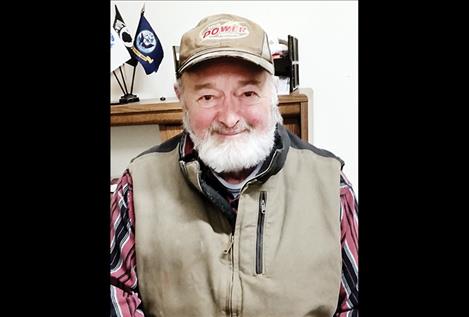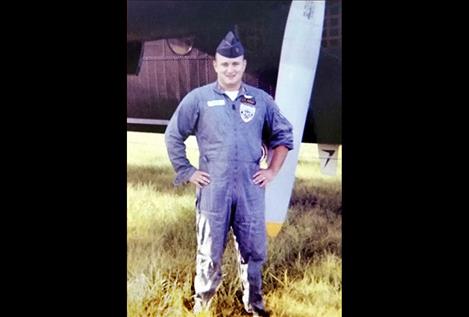Veteran Spotlight
Joseph G. Brooks Sept. 30, 1944 Vietnam U.S. Army - CWO-2 (Chief Warrant Officer - 2nd Class)
Hey savvy news reader! Thanks for choosing local.
You are now reading
1 of 3 free articles.
Joseph comes from a military family with members serving in WWI and WWII. It was expected that he would join, and he did. In 1963, Joseph enlisted in the Army and went to Fort Ord, California, for basic training. He was there as a private for about three hours and decided it wasn’t for him. So, he volunteered for Officer Candidate School, a prerequisite for flight school, which is what he really wanted. His test scores were good, and he was accepted. Because there was already a build up for Vietnam, basic training was extended to 10 weeks.
In case flight school didn’t work out, Joseph needed a backup plan so he went to Fort Eustis, Virginia, for about a year to learn aircraft maintenance. He actually did some flying there, thanks to some friendly warrant officers, so when he moved to Fort Rucker, Alabama, for his first official flight school, he already knew some of the basics. He also did jump qualification – not to be a paratrooper, but for survival in case his plane went down. He soon decided he’d rather ride the plane down and take his chances.
Joseph was commissioned as a Warrant Officer, which is a rank the Army gave its pilots. It was comparable to a Navy or Air Force first lieutenant. By definition, it’s the rank for someone highly specialized in a specific field. At age 19, Joseph was the youngest Army pilot in the service. He reported to Fort Sill, Oklahoma, for a short two weeks to situate his wife and young child and then went to Fort Rucker for advanced training. In December of 1965, he was deployed to Vietnam and actually flew the plane, taking himself and a squad of pilots to their overseas assignment.
Flying in Vietnam was doubly dangerous. There might be as high as 3000 aircraft in the air with no air traffic control. Aviation weather was tricky. The saying is that Vietnam has two seasons: dry and wet. Dry is when it only rains in the morning, and wet is when it also rains in the afternoon and at night. Joseph says they never scrubbed a mission because of weather. They had enough aerial weather detection to stay clear of the worst of it.
Joseph and the other pilots were always right in the fight, sometimes flying all day and never getting more than 200 feet above the ground. This was real “crop duster” type flying. One time, he was caught along the coast between offshore destroyers and inland artillery batteries. He could feel the shells shaking the plane. Pilots were given 800-foot landing strips, but sometimes it seemed the tape measure might have been a little short. He saw another pilot “discover” some rubber tree stumps that had been left at the end of the airstrip. Airstrips came to be identified by the debris from crashes. “Where are you flying today?” someone would ask. The answer: “Over to where that C-130 went down.” Joseph flew all of the different fixed-wing planes the Army had, but mostly the CV-2.
Flight commanders and office personnel had to fly four hours a month to keep their flight status, so “milk runs” would be authorized for this “straphanger” bunch. Joseph believes they were the source of many of the crashes. Joseph, on the other hand, was spending 60 hours a month flying, sometimes sleeping on the plane. He did one stretch of 60 days without a break. That was one of the reasons he decided not to re-enlist. Also affecting his decision was the orders the Amy had to transfer their fixed-wing planes to the Air Force. Rather than being kept by the Air Force, they ended up in South Vietnamese hands.
Joseph’s last flight in Vietnam was during his transition time when Army pilots were training the Air Force pilots in skills such as “strip hopping.” He had a full bird Colonel (ranked above a lieutenant colonel) with WWII experience as his student. During one conversation, Joseph, 21 years old, said: “Sir, what can I possibly teach you?” The answer was, “You can teach me to stay alive.” He was the best student Joseph ever had.
When Joseph’s tour ended in January of 1967, he returned to Fort Rucker and worked as a flight instructor for the remainder of his five-year term of service.
When Joseph got out, he took the FAA test and qualified to land planes, multi-engine planes and as a flight instructor. He had an offer to fly for Western Airlines, but when he learned he would be stationed in California, he said, “No thanks.” He was going home to Ronan.
One time, Joseph “rode down a plane” in Vietnam and that’s when he got his “souvenir” injury. It didn’t really disable him until later, during his last three months at Fort Rucker. A student pilot caused flight problems that aggravated the old injury. Joseph says the Veteran’s Administration has been good to him for both medical treatment and disability support.
Would he do it all again? Joseph says when he was 18, he was 10-feet tall and bullet-proof. Now he’s old, crippled up and hurting in places he didn’t know he had; but, yes, he would do it again. His mom still wouldn’t be happy about it, but it was accepted as a family duty. Military service is not for everybody – a person has to be tough enough. On the other hand, although Joseph wouldn’t force combat on anyone except in a national emergency, he believes everyone should serve for two years. It doesn’t matter to him if a person carries a gun or a pickax, but they need the experience and discipline besides an understanding of how to support our country. He believes today something more dangerous than war is ignorance of our history, our foundations and what made us the country we are. There is no free lunch, and there is too much whining. Joseph believes public education needs to do a better job.
Most importantly, military service strengthened Joseph’s belief in God – but for God’s grace, he wouldn’t be here today.
Thank you for your service, Joseph.

















